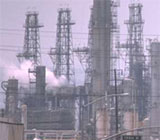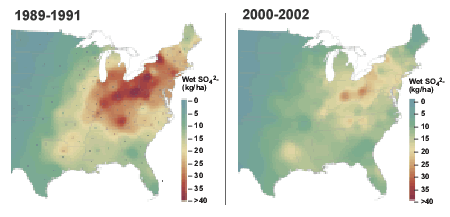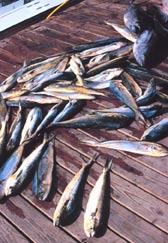|
"Cap and trade" systems—also known as "emissions trading" or "allowance trading"—allow companies to buy and sell "emission allowances" as long as the industry stays under a cap for total emissions of a particular pollutant.
Economists usually favor this approach since it allows market forces to work to fix environmental problems efficiently. But given that the only "green" characteristics of many economists are the lines on their yawn-inducing charts, it's worth exploring whether cap-and-trade systems really reduce pollution and when they make sense—or don't.
In a cap-and-trade system, the government sets the total amount of a pollutant that can be put into
 the environment by an entire industry or class of emitters. The government establishes emission allowances, which can be bought and sold among companies in the industry. At the end of the year, each company must hold a number of emission allowances equal to the amount of the pollutant they emitted.
the environment by an entire industry or class of emitters. The government establishes emission allowances, which can be bought and sold among companies in the industry. At the end of the year, each company must hold a number of emission allowances equal to the amount of the pollutant they emitted.
As industrial capacity, energy usage, and emissions grow over time, total emissions must still stay within the cap, which limits total pollution output while allowing industry some flexibility and predictability to meet their growing needs. Of course, the cap must be set low enough in the first place for the program to confer a true environmental benefit.
Companies that can easily add pollution controls and reduce their pollution more than average can then sell pollution credits to companies that would have a more difficult time implementing modern pollution controls, or they can "bank" the credits to apply towards emissions in future years. In essence, some companies spend money for the right to continue polluting at higher levels, but it's cheaper for them than modernizing and, overall, more economically efficient for the industry.
Cap-and-trade systems make perfect sense for emissions that have a global impact but little or no local impact. Carbon dioxide—the main greenhouse gas—is well suited to a cap-and-trade system because there is no direct effect of local CO2 emissions on the inhabitants of any nearby city, county, or region—the problem is only important from a global perspective.
Many pollutants do have negative effects that are regional or local in nature, and cap-and-trade systems make less and less sense as the local effects become more and more serious. Two examples are worth looking at more closely: sulfur dioxide and mercury.
Sulfur dioxide is one of the pollutants responsible for acid rain, which can damage forests and acidify lakes and streams, rendering some of them incapable of supporting aquatic life. SO2 air pollution also causes respiratory and other health problems in people.
A cap-and-trade system was imposed on sulfur dioxide emissions in the US in the mid-1990s. As of the end of 2002, the last reporting period available as of this writing, reduction of SO2 was ahead of schedule—down 41% from 1980—with the market price for emission allowances significantly lower than the dire predictions made by industry critics prior to the program's implementation. As one can see from the EPA chart below, wet deposition of sulfur dioxide is much less today than it was in 1990. Overall airborne sulfate concentrations have decreased similarly.

Even though the trend is good, the graph on the right shows that we still have a ways to go before we can declare victory on the sulfur dioxide part of the acid rain problem. Indeed, many ecosystems today continue to suffer from the effects of acid rain. Additionally, SO2 pollution does have local and regional effects on the environment and human health, so it does not fully meet the criteria for being a "good pollutant" to address with a cap-and-trade system. Still, the sulfur dioxide cap-and-trade system has probably reduced total SO2 pollution levels faster than could have been achieved by strict limits for individual emitters.
In general, the cap-and-trade system for S02 is a success, but we should keep ratcheting the total cap downward to address the remaining SO2-related acid rain problems. We should also address any situations where pollution from specific emitters is causing significant local or regional problems, even if the emitter is operating within the technical limits of the cap-and-trade system. (This is allowed and appropriate under the provisions of the Clean Air Act.)
 Mercury is a serious human neurotoxin. It can enter humans directly through mercury-contaminated air or drinking water, or indirectly through consumption of contaminated seafood. In all of these exposure routes, the main initial source of the mercury is air emissions from power generation, waste disposal, and other industrial activities.
Mercury is a serious human neurotoxin. It can enter humans directly through mercury-contaminated air or drinking water, or indirectly through consumption of contaminated seafood. In all of these exposure routes, the main initial source of the mercury is air emissions from power generation, waste disposal, and other industrial activities.
The negative consequences of mercury emissions occur more locally and regionally than nationally or globally (relative to the emission point). This makes mercury a bad candidate for a cap-and-trade system. While the overall amount of mercury in the nation would improve, some locales would continue to suffer the effects of a potent pollutant.
In the case of mercury, the most appropriate approach is to hold each source of mercury emissions to a set limit.
To summarize, cap-and-trade systems make the most sense for pollutants where:
- the effects are wide-ranging or global (as opposed to local or regional);
- there are a large number of emission points; and
- the cost of controls varies from source to source, thus providing the basis for a market to trade emission allowances.
Not all pollutants meet this test, and the fact that a cap-and-trade approach would still make economic sense should not trump the need to protect the environment and human health locally. We should always temper economists' enthusiasm for cap-and-trade schemes with proper analyses that consider ecological and human-health issues.
We here at Grinning Planet usually like to end with something funny, but since some economists seem to have the power to teleport anything that's remotely funny to some unknown time and place, we'll put a cap on this Eco-Logical right now.
Know someone who might like this article about cap and trade systems?
Please forward it to them.
More articles and resources on....
Get Grinning Planet free via email
|


